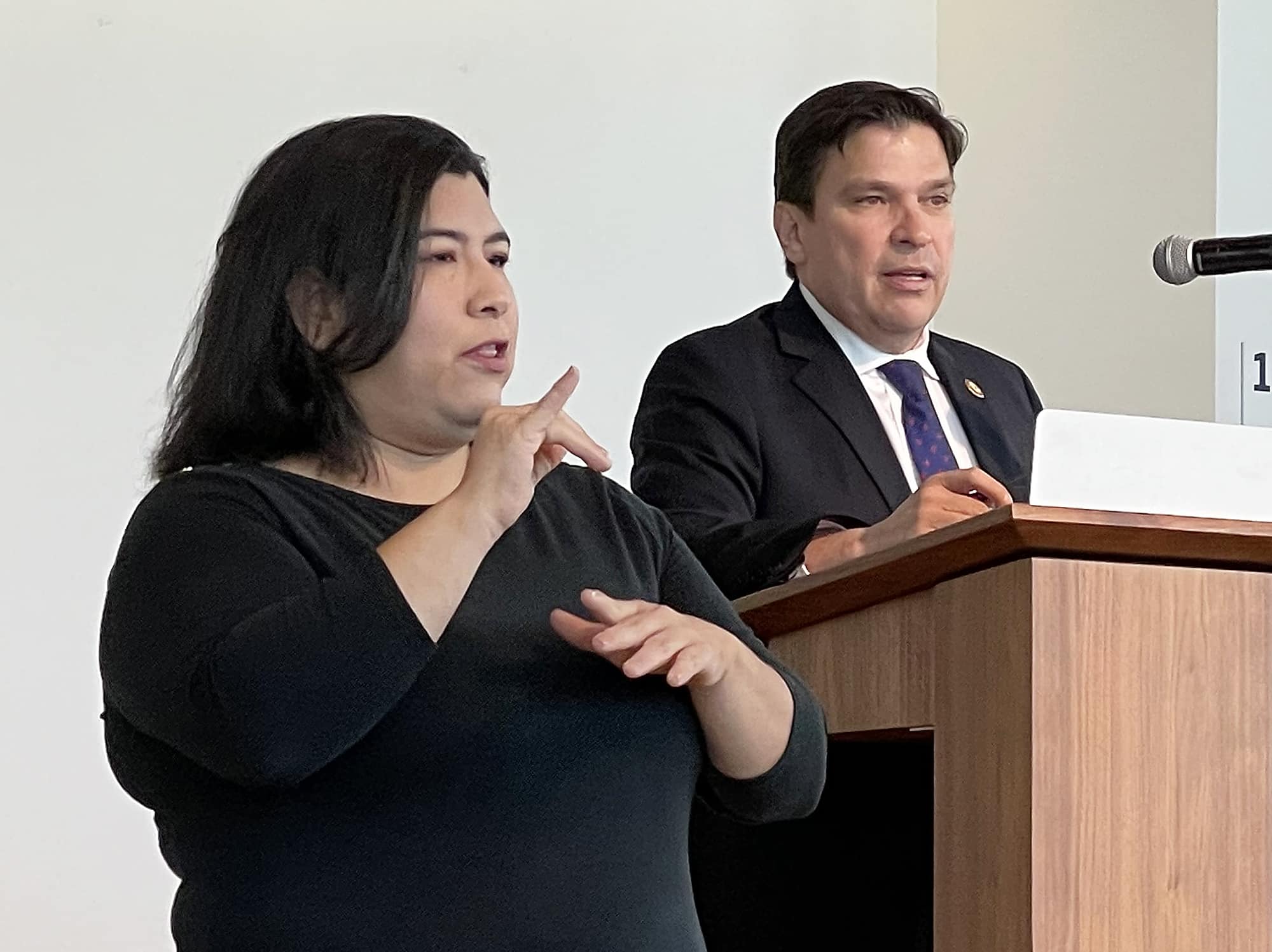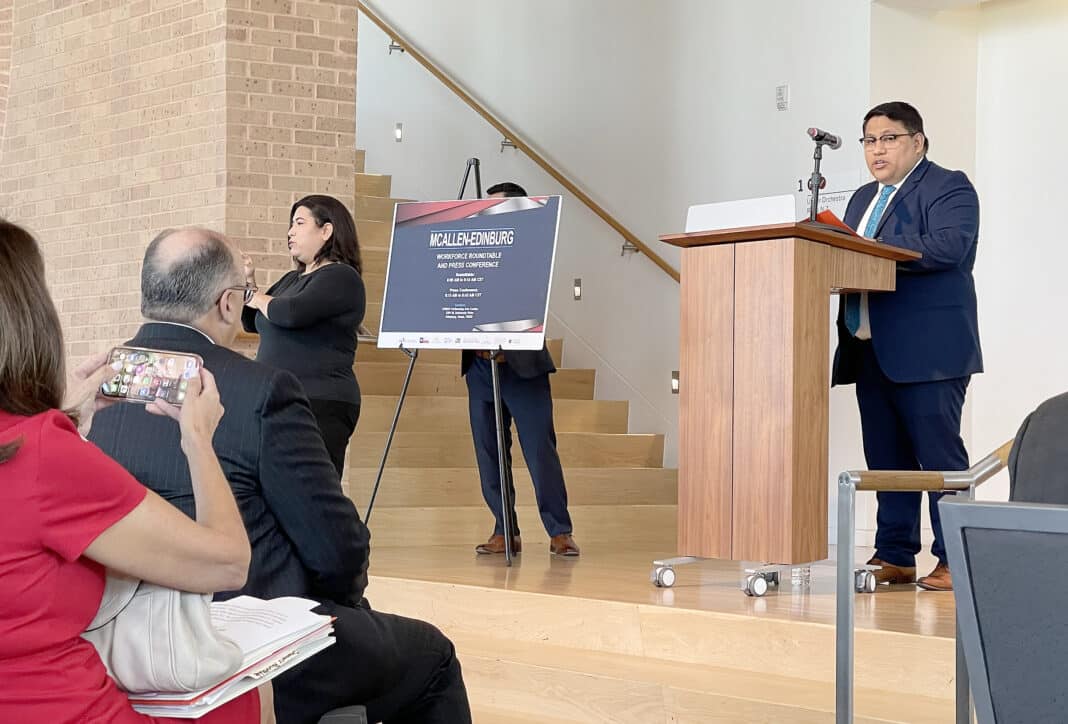EDINBURG — Just days after the ninth anniversary of the passage of the DACA program, or Deferred Action for Childhood Arrivals, local elected officials and business leaders gathered here with U.S. Rep. Vicente Gonzalez for a roundtable discussion on immigration reform.
The group joined Gonzalez, D-McAllen, who cosponsored the American Dream and Promise Act, which passed with bipartisan support in the U.S. House of Representatives this March, in urging the Senate to pass the legislation, as well.
Seen as an update to the Development, Relief, and Education for Alien Minors Act, or DREAM Act — which was first proposed in 2001, but has never been passed by Congress — the American Dream and Promise Act would give millions of young people the opportunity to gain legal immigration status and offer a pathway to U.S. citizenship.
Gonzalez called the passage of such legislation one of the most important issues facing young people in the Rio Grande Valley and beyond. But the congressman also spoke of the difficulty in passing the DREAM Act, which has been met with nearly a dozen legislative failures since it was first introduced during the presidency of George W. Bush.
“We talked about the complications in Congress and the complications of politics around the country, and immigration being such a contentious issue,” Gonzalez said of the roundtable discussion.
“But it’s something that we need to come to terms with, that we cannot continue to grow this economy, and we cannot continue to expand as the largest economy in the world without a comprehensive immigration plan. And Dreamers are the forefront of this,” Gonzalez continued.
The lawmaker’s comment about the importance of DREAMers to the U.S. economy was one that was later echoed by the rest of the roundtable delegation.
“Research shows America has much to benefit from passing a DREAMer solution, projecting that contributions could increase our U.S. GDP (gross domestic product) by $15.2 billion each year,” said Jorge Martinez, director of the LIBRE Initiative, a nonpartisan organization that supports the economic prosperity of the Hispanic community.
Closer to home, DREAMers contribute substantially to the Texas economy, explained Sergio Contreras, CEO of the RGV Partnership — and never has that been more evident than during the COVID-19, when the pandemic revealed just how many DREAMers are essential workers, he said.

(Dina Arévalo | [email protected])
“That includes 6,300 DACA healthcare workers who are here in Texas. They contribute more than $244 million in state and local taxes annually,” Contreras said.
“They are entrepreneurs, teachers, nurses, engineers. They live and they work and they’re our neighbors,” he said.
In the Valley, there are more than 14,000 DREAMers who have “over $142 million in purchasing power,” Gonzalez said.
“We create so many obstacles, not only in Congress in passing a bill, but even obstacles during the (DACA application) process,” Gonzalez said.
The roundtable delegation got to hear about some of those obstacles Friday morning firsthand from DACA recipient and UTRGV alum Giovanni Escobedo.
Escobedo, who was born in San Luis Potosi, Mexico, was brought to the United States when he was 15 years old. Raised in the Dallas area, Escobedo’s goal of achieving a higher education were what first made him realize how many barriers his undocumented status created.
While enrolled at UT-Dallas, Escobedo hit a roadblock while attempting to finish a degree in biomedical science. He was unable to complete the degree due to a requirement for a background check for his senior design project, he said.
“This experience led me to become involved in advocacy and persuading Congress and President Barack Obama to pass the DREAM Act,” Escobedo said.
Escobedo applied for DACA protection once that law passed in 2012, but still, it took him a decade before he ultimately earned his undergraduate degree — a bachelor’s degree in political science from UTRGV.
He currently works with the Texas-based educational advocacy group, Raise Your Hand Texas, while pursuing a graduate degree in political science. Escobedo also hopes to one day attend law school.
Escobedo said none of those achievements would have been possible without the protections afforded him by the DACA program.
“I am grateful for the DACA program, but I understand and I know that it’s under threat. Any day now, Judge Andrew Hanen will decide if the program can be terminated or not,” Escobedo said.

(Dina Arévalo | [email protected])
Escobedo referred to U.S. District Judge Andrew Hanen, who since 2018, has been presiding over a lawsuit filed by Texas Attorney General Ken Paxton to dismantle the DACA program.
Hanen, who sits in federal court in Houston, has ties to the Valley, having initially been nominated to the bench in Brownsville by then-President George W. Bush. He served there for 16 years before relocating to Houston.
A conservative, Hanen is no stranger to immigration litigation, and has made numerous rulings in favor of challenges to progressive immigration reform, including ruling against a 2012 program similar to DACA put forward by then-President Barack Obama.
Paxton filed that lawsuit, just as he did the one which remains pending in Hanen’s court today.
The newer lawsuit remains stalled after the U.S. Supreme Court in December 2020 rejected an effort by the Trump administration to rescind DACA.
And in March, shortly after the House passed the American Dream and Promise Act, Hanen ordered attorneys for both sides to submit briefs on how the legislation could impact the lawsuit should it pass the Senate, as well.
With his future, as well as that of hundreds of thousands of other DACA recipients throughout the country, in limbo, Escobedo said Congress needs to act now.
“The solution to this problem is a federal DREAM Act, which would give me and others the opportunity to achieve these dreams and contribute fully to our communities,” he said.
“I am asking Sen. (John) Cornyn and Sen. (Ted) Cruz to pass the federal DREAM Act, and I encourage everyone to contact their senators and ask them to pass this legislation,” Escobedo said.
The Senate has yet to vote on the bill, however, Cornyn and Cruz — who both sit on the Senate Judiciary Committee — got their first look at the bill during a committee hearing on Tuesday.





